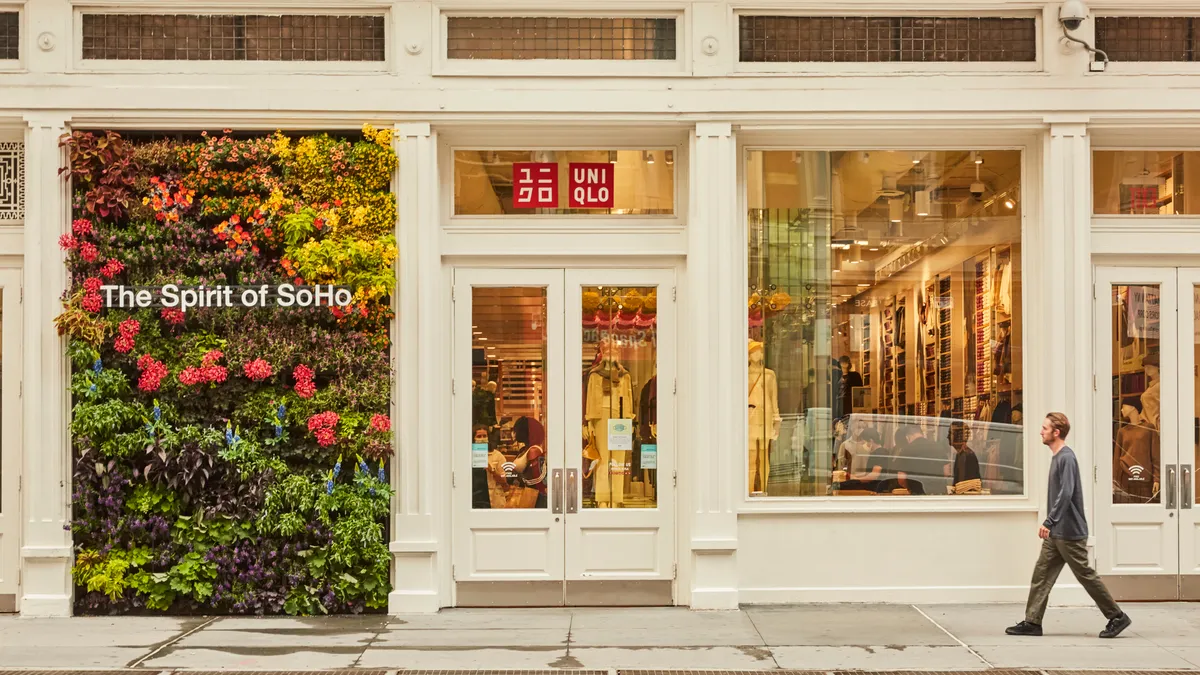NEW YORK – Uniqlo’s parent Fast Retailing is banking on RFID technology to improve its supply chain management, and in turn, drive digital innovation and international growth.
The company “is finally coming to a phase where we’re going to be bigger internationally. … We are a Japanese-based company, but we're going to go global in a big way,” Takahiro Tambara, CIO of Fast Retailing, said in an interview with Retail Dive at the National Retail Federation’s Big Show conference.
Tambara said the company wants to accelerate its expansion in the U.S. and European markets. Tambara said RFID technology is the foundation of creating a great in-person customer experience.
“We’ve already introduced RFID for our self-checkout services as well as many other services for our customers using RFID technology,” Tambara said. “Our strength is having retail stores. So we have been developing our digital platform so that customers can have a seamless shopping experience.”
Uniqlo had 45 U.S. stores in late 2022. Tokyo-based Fast Retailing had global sales of 2.3 trillion yen ($16.6 billion at the time), for the fiscal year ending Aug. 31, 2022. Fast Retailing made headlines earlier this month by announcing that it would raise its full-time Japanese employees’ pay by up to 40%.
Uniqlo is the largest of eight brands in the Fast Retailing Group. The group’s other brands are GU, Theory, PLST, Comptoir des Cotonniers, Princesse tam.tam, J Brand and Helmut Lang.
Tambara is confident and optimistic about the importance, value and future of in-person brick-and-mortar retail.
“It’s critical that we serve customers face-to-face,” Tambara said. “The more people become digital natives, the more important becomes that human touch at the store experience. So we want to evolve our face-to-face customer experience by developing digital technology to better have our associates serve customers in stores.”
Tambara was a featured speaker at an NRF panel discussion sponsored by materials science company Avery Dennision. “We already had a business relationship with Avery Dennison because they have been supplying our price tags and care labels even before we started working on RFID together,” Tambara said.
The pandemic created unpredictability that’s driven agility in the supply chain, said Bill Toney, Avery Dennison’s vice president of global RFID and digital market development, who was also a featured panelist.
“Working with an innovator like Fast Retailing always keeps us on our toes because they're always challenging us to innovate,” Toney told Retail Dive. “So we're privileged and honored to work with Fast Retailing.”
Tambara said that “even before the pandemic, we already worked on transforming our supply chain, including the introduction of RFID and using other technologies.” What the company wants, Tambara said, is to build a supply chain that can “deliver what customers want whenever, wherever they want.”
Toney said interest in RFID is moving beyond the apparel industry.
“And now as apparel really is starting to prove out the use case, we see a lot of broader adoption, outside of apparel,” Toney said. Growing interest and adoption of RFID may also enable companies to respond to another emerging consumer trend — a desire to know where stuff really comes from, who made it, what’s in it and where it was made.
“We're working on other technologies to allow consumers to scan products and understand where their product was made — the traceability of the product [and the] transparency of the product. So consumers now are starting to look in that world as well,” Toney said. “We think that's another big emerging digital trend that's coming together.”
Editor's note: Retail Dive conducted the interview with Takahiro Tambara via interpreter at the company's request.
















